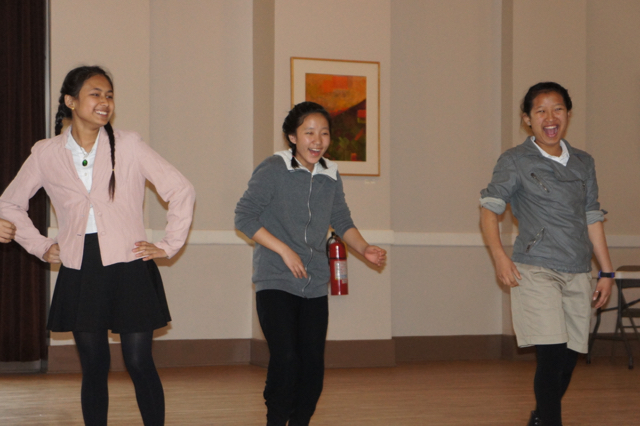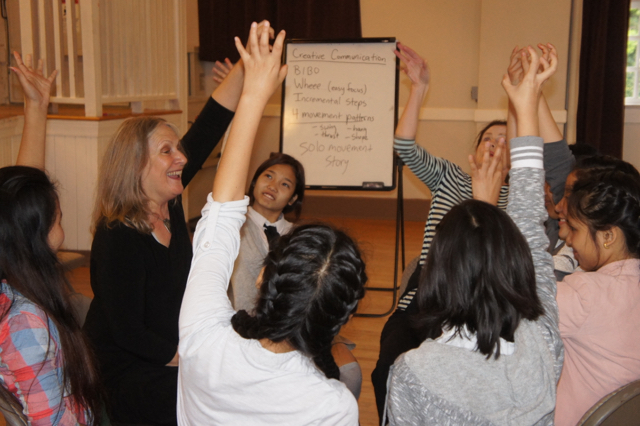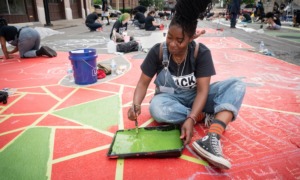
Photos by Stell Simonton
Teens at Clarkston Community Center near Atlanta, become more expressive in English as they do InterPlay exercises involving speaking and movement. Teens in the Creative Communication Class come from countries including Nepal, Ethiopia and Somalia.
In the high-beamed auditorium at the Clarkston Community Center near Atlanta, a dozen teenagers sit in a circle on metal chairs.
Each one sings out his or her name, making the sound musical and adding a dramatic gesture at the request of instructor Ruth Schowalter.
Shy participants screw up their courage to become dramatic. The entire group repeats each name and movement, singing the sounds loudly and energetically.
Schowalter asks the group to do another exercise. It begins with the words: “I could talk about …”
They go around the circle quickly.
“I could talk about how much I use my phone,” one says.
“I could talk about how much I want to sleep,” another says.
“I could talk about how much I miss my home,” a third says.
“I could talk about how much I love this workshop,” says a fourth.
It’s the Creative Communication workshop offered once per week to the teens in the community center’s after-school program, which serves resettled refugees. The teens in this program are from various countries including Nepal, Ethiopia and Somalia.
As Schowalter models each activity, the students follow. They get up, move, dance, take poses and speak out.
To an observer, it looks like a theater arts class. In fact, it’s a creative method called InterPlay, which uses improvisational movement and speech to “unlock the wisdom of the body,” according to the organization’s website.
Schowalter said InterPlay is a way for kids to “embody the language.” She is a certified InterPlay leader and an instructor in English as a second language at Georgia Tech University.
“Language is taught as something in the head,” Schowalter said. Interplay says “we’re more than the head.”
“By moving, we activate the kinesthetic imagination,” she said.

Instructor Ruth Schowalter leads the Creative Communication Class in a hand dance. Movement helps “unlock” the language for these students of English as a second language, she says. Most of the teens fled their home countries and have been resettled in the United States.
Often students of a foreign language have a repository of vocabulary and grammar but they can’t use it, Schowalter said. Loosening up and moving the body helps loosen up the language and let it flow. When you move, you access what you know, she says.
Derga Solomon, 19, is a senior at Tucker High School. He is from Ethiopia and will go to college in the fall.
“[The class] helps us communicate more freely and easily,” he said. “I like the movement.”
After a Monday session, “you wake up on Tuesday morning and feel good,” he added.
The exercises let kids play around with what they have to say or not say, according to Schowalter. Students do various InterPlay activities in pairs, small or large groups or alone.
In the process, they speak without preparation and are encouraged to make things up.
In the Clarkson workshop, Schowalter asks them to pair up and babble in a made-up language for a moment.
“Do it even if you don’t have anything to say,” she tells them. In another quick exercise, they intersperse real English with babble.
In a “walk-stop-run” exercise, the whole group moves around the room, weaving in and out of each other, walking, stopping and running, making up their movements as they go along.
Kids laugh and try various speeds, sounds and poses. The playfulness of the whole-body exercises has a freeing effect. InterPlay provides an opportunity for participants to take up space in the world and express themselves.
When speaking “we play with volume, speed and pitch,” Schowalter said. Language is not just “a mouth moving.”
Teens who are refugees, “come with stories,” said Shamsun Nahar, site coordinator of the after-school program for the Center for Pan Asian Community Services. They’ve been through stressful experiences.
“They have a lot of anxiousness in them,” she said. The InterPlay class is a place where they can relax and become who they want to be.
It’s a creative outlet, she wrote in a blog.
“The best part is hearing so distinctly and loudly the voices of students who are normally shy,” she wrote.
The kids connect with each other. But the workshop also helps them connect with parts of themselves that have been “suppressed and stifled,” she wrote.
Students develop confidence by taking incremental steps, Schowalter said.
Yuma Rai, 16, is a student at Clarkston High School. She says the workshop helps her communication and leadership skills.
“It makes me feel very happy,” she said. “It helps me gain strength for my studies.”































